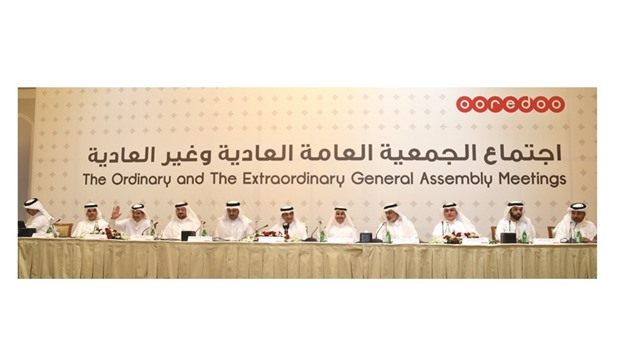Ooredoo and international companies Huawei and NSN have signed an agreement for the establishment of the first 5G research and development (R&D) centre in Doha, a laboratory that will conduct experiments on the 5G network, Ooredoo Qatar CEO Waleed al-Sayed said yesterday.
Al-Sayed said Ooredoo’s infrastructure “is always ready”, but noted that the R&D lab would take another year to be operational.
“Our infrastructure is always ready. We adapt to any new technology very easily because we have selected technology that is agile and can accept new capabilities without making any fundamental changes in our infrastructure,” al-Sayed told Gulf Times on the sidelines of Ooredoo’s Annual General Meeting yesterday.
“The building is ready, but the set-up and facilities are still being installed. We are ready to implement 5G in Qatar as soon as it is standardised and available commercially. We believe that the first stage of 5G will be available for testing by 2018, and commercially it is going to be available by 2020,” he explained.
Al-Sayed said 5G is capable of providing Internet speeds from 1GB to 10GB, once available in the market, “but the challenge,” he stressed, “is how fast the standardisation would be brought forward.”
He also said Ooredoo’s “new focus for Qatar and for the entire Group is to enter the ICT arena.”
“We are not playing a big role in ICT, but now we have received approval to invest heavily in building our capabilities in our data centres, and bringing the right talent who will provide managed solutions for our business customers.
“But at the same time we are going to establish ICT capabilities either by building it ourselves or by acquiring a notable company to do it for us. In either case, we are going to be the biggest and most important ICT player in the market,” al-Sayed emphasised.
During the meeting, Ooredoo chairman Sheikh Abdulla bin Mohamed bin Saud al-Thani said Ooredoo has withdrawn its investments to roll-out WiMAX (Worldwide Interoperability for Microwave Access) technology in Pakistan, Jordan, and the Philippines.
Al-Sayed said Sheikh Abdulla noted during the meeting the WiMAX technology was “not picking up worldwide.”
But for 2016, al-Sayed said Ooredoo’s plan is to focus on its investments and strengthening the company’s footprint, especially in North Africa and Southeast Asia.
“In addition to that, Kuwait, Qatar, and Oman will always be our main focus. We have already rolled-out 4G in those countries, including Indonesia. Very soon, we will roll-out 4G in Tunisia and Algeria. We are also seriously thinking of rolling out 4G in Myanmar,” al-Sayed said.
He added: “In every country, we have around 11% to 20% of the revenue being spent on capital investment to build our network. The amount would depend on factors such as the country’s geography and size, and it also depends on what we are focusing on and where growth is coming from.”
On the newly-launched Ooredoo TV, al-Sayed said Ooredoo now has 15,000 subscribers. “Our customers are increasing on a daily basis. Our ambition is to reach around 80,000 Ooredoo TV customers by the end of the year,” he said.

Ooredoo’s annual general meeting chaired by Sheikh Abdulla bin Mohamed bin Saud al-Thani in progress. PICTURE: Jayan Orma
